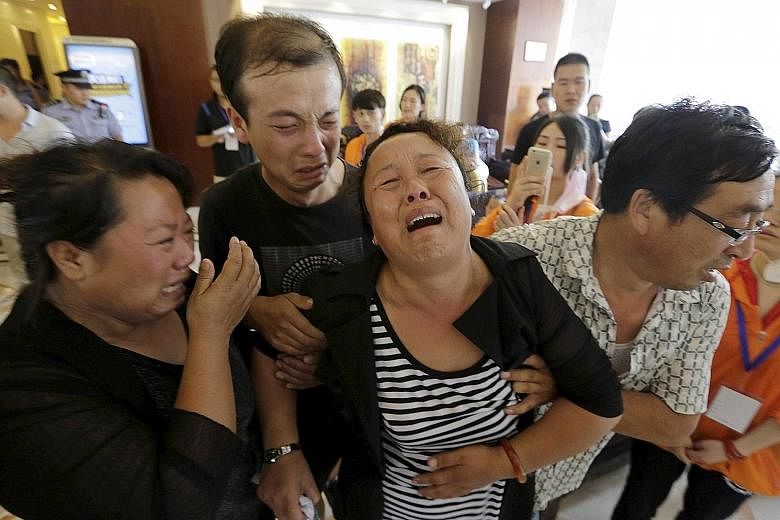TIANJIN • China yesterday evacuated residents who had taken refuge in a school near the site of two huge explosions in this north-eastern city, state media said, after a change in wind direction prompted fears that toxic chemical particles could be blown inland.
This came as the authorities for the first time confirmed the presence of deadly sodium cyanide at the site of two huge warehouse blasts that killed 104 people. The chemical, fatal when ingested or inhaled, was confirmed as being "roughly east of the blast site", the state-run Beijing News said.
Mostly used in chemical manufacturing and in the mining industry to extract gold and silver, cyanide is soluble in water and also absorbs water from air. Its dust is easy to inhale. When dissolved or burned, it releases the highly poisonous gas hydrogen cyanide.
At a press conference yesterday, Mr Gao Huaiyou, vice-head of the Tianjin bureau of work safety, said that chemicals stored in a warehouse at the site possibly include sodium cyanide, but further confirmation was needed. Some local media reported that Rui Hai International Logistics, owner of the warehouse, had as much as 700 tonnes of sodium cyanide, but Mr Gao said this had not been verified.
Officials only confirmed the presence of calcium carbide, potassium nitrate and sodium nitrate. Calcium carbide reacts with water to create the highly explosive acetylene.
An area 3km from the blast site was cordoned off, Beijing News said. Anti-chemical warfare troops have entered the site, some other reports said. A taskforce had been despatched to locate and measure the contaminated area and prevent its spread in the sewage, Xinhua said.
Officials have so far insisted that air and water quality levels are safe. The residents, however, expressed concern.
"I do feel a bit afraid," said construction worker Li Shulan, 49, when asked about the air quality. "As you can see, our boss is making us wear masks."
No cyanide had been found in the ocean surrounding the port, the State Oceanic Administration of China said in a post on its website.
The evacuees were advised to wear long trousers and face masks as they "evacuated in an orderly fashion", according to a post on the official microblog of the Tianjin branch of the National Health and Family Planning Commission of China. The streets appeared calm.
In one piece of encouraging news, a 50-year-old man was rescued 50m away from the blast zone. The man was reported to be suffering from a burnt respiratory tract but was in a stable condition after surviving three days in a shipping container.
Seven small explosions were also reported in the area yesterday. A fresh blaze ignited cars in a parking lot next to the blast site. The cause was not immediately clear.
About 6,300 people have been displaced by the blasts, with around 721 injured and 33 in serious condition. Twenty-one of the dead were fire fighters.
Chinese President Xi Jinping yesterday urged the authorities to learn from the "extremely profound" lessons posed by the blasts.
He said the blasts and a recent string of serious accidents exposed severe problems in the work safety sector, adding that the authorities must keep the "people's interest first".
REUTERS, AGENCE FRANCE- PRESSE, XINHUA

